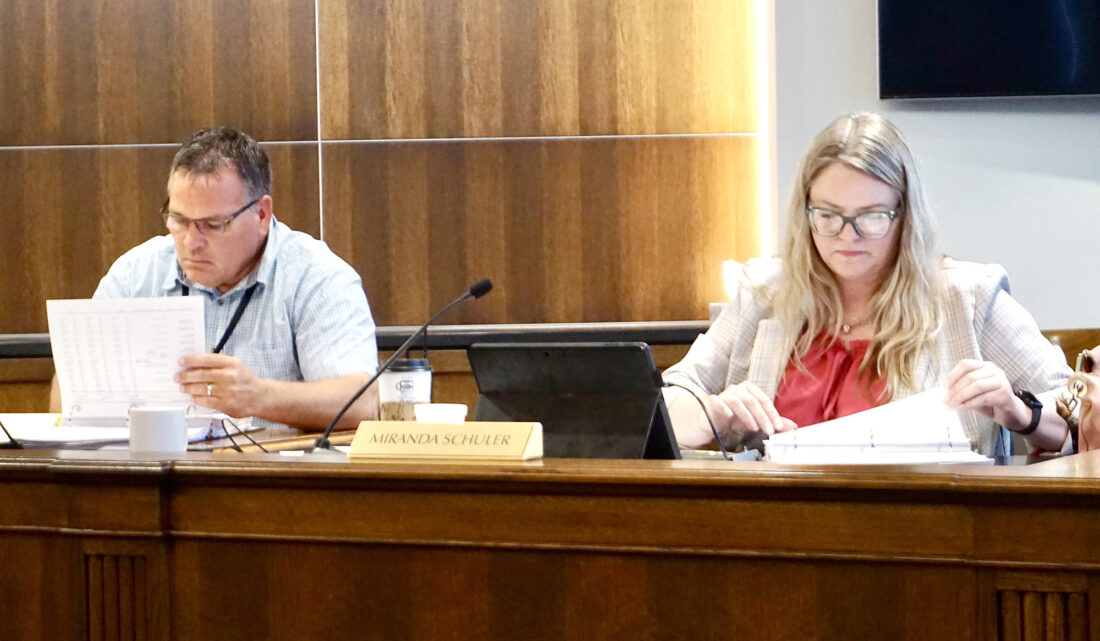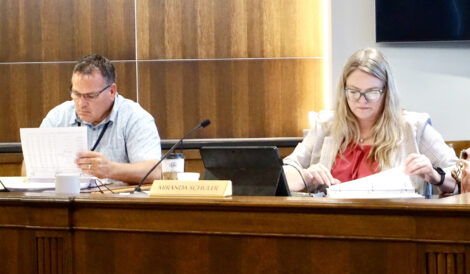Commission struggles to find spending cuts

Jill Schramm/MDN Ward County Commissioners Jason Olson, left, and Miranda Schuler look through copies of a draft budget during budget discussions by the commission Tuesday.
After scouring a $68.7 million budget draft to find $468,517 in cuts, Ward County commissioners were left with about $1.2 million in spending that remained to be eliminated to come under the state’s 3% cap on tax increases.
Commissioners are hoping to levy less than a 3% increase but discovered it won’t be easy.
“It’s going to be a very difficult thing just to get to the 3,” Commissioner Jason Olson said. “To me, that has to be our first target. We have to hit the first target before we begin to think about the second target.”
An area not yet reviewed by the commission is staffing, salaries and health insurance. The budget draft includes pay plan step increases and a cost of living increase of 1.5%. Auditor/Treasurer Marisa Haman estimated cutting the increases to zero would roughly save $750,000, which remains well short of the $1.2 million commissioners continue to look for.
“It’s going to boil down to justifying all the employees we have,” Commission Chairman John Fjeldahl said. “That’s not fun to do.”
The commission’s original budget draft proposed a tax levy of $25.9 million.
The commission made a funding reduction to First District Health Unit that keeps its annual increase to no more than 3%. That would require the health unit to lower its requests from its other six counties if it wants to keep its funding streams equalized. Other outside organizations also had their requests scrutinized and scaled back in some cases.
The commission made scattered cuts among the various county departments based on input from department heads. Commissioners hesitated to take on new expenses, such as $250,000 to demolish an old Kenmare hotel that the county foreclosed on for back taxes, a Courthouse elevator replacement and $285,000 to hire three juvenile detention officers.
The detention center was found out of compliance in a recent Prison Rape Elimination Act inspection because its facility design doesn’t lend itself to constant supervision by officers.
“We need to have somebody in each block, and a camera won’t work,” Sheriff Robert Roed said. “In order for us to do that, we would have to add three people.”
The Sheriff’s Department is appealing the PREA decision but it could be several weeks before the matter is determined. If the appeal fails, the county would need to come up with $285,000 or close its facility and hope the detention center in Grand Forks has room for the youth. Otherwise, the next available facility would be in Moorhead, Minnesota, Roed said. The Bismarck facility already sends its overflow to Minot, he said.
“I don’t want to spend additional money, but this is a big liability hanging over our head,” Commissioner Miranda Schuler said in moving that $285,000 be added to the budget. Schuler was joined by Commissioner Jim Rostad in supporting the motion, which failed 2-3.
Schuler also found no support for eliminating health insurance coverage for commissioners, and her motion for a commissioner salary freeze failed 2-3 with support only from Commissioner Ron Merritt. Commissioner salary freezes have been imposed in the past.
In the 2026 budget as it currently stands, commissioners would be paid $23,215 a year. The budget includes $120,800 for commissioners’ health insurance coverage, which excludes Schuler, who declined it.
“I think it’s excessive,” Schuler said of pay and benefits. “When I was on the city council, they paid $495 a month with no benefits. When I was on the school (board) It was $600 a month and no benefits. You don’t choose to run for these positions, and you shouldn’t choose to run for them, based on the compensation or benefits package.”
Fjeldahl said he isn’t motivated by the pay and benefits, but they could attract people to serve who otherwise couldn’t afford to do so.
“We want to keep good people here,” he said of employees, “and that package helps through that, and that includes commissioners.”
Fjeldahl suggested eliminating the $40,800 a year in dues to the North Dakota Association of Counties due to what he considered to be using taxpayer dollars to lobby against the property tax elimination measure last year.
“I don’t think we should be spending dues money to encourage that kind of behavior,” he said. “So, maybe, on principle, I’m just going to make the motion that we don’t pay them unless they change their policies.”
The commission had rejected a similar move to withdraw from the association in the past because of the loss of education, services and other benefits provided by the association.
Rostad said he agrees regarding the association’s lobbying but does not believe it is in Ward County’s interests to pull out of the organization due to the benefits.
Fjeldahl and Merritt voted for the motion and Olson, Schuler and Rostad voted against.
Haman also will be investigating election costs to determine cost savings associated with closing polls in Sawyer and Ryder and returning to mail voting for those areas.





